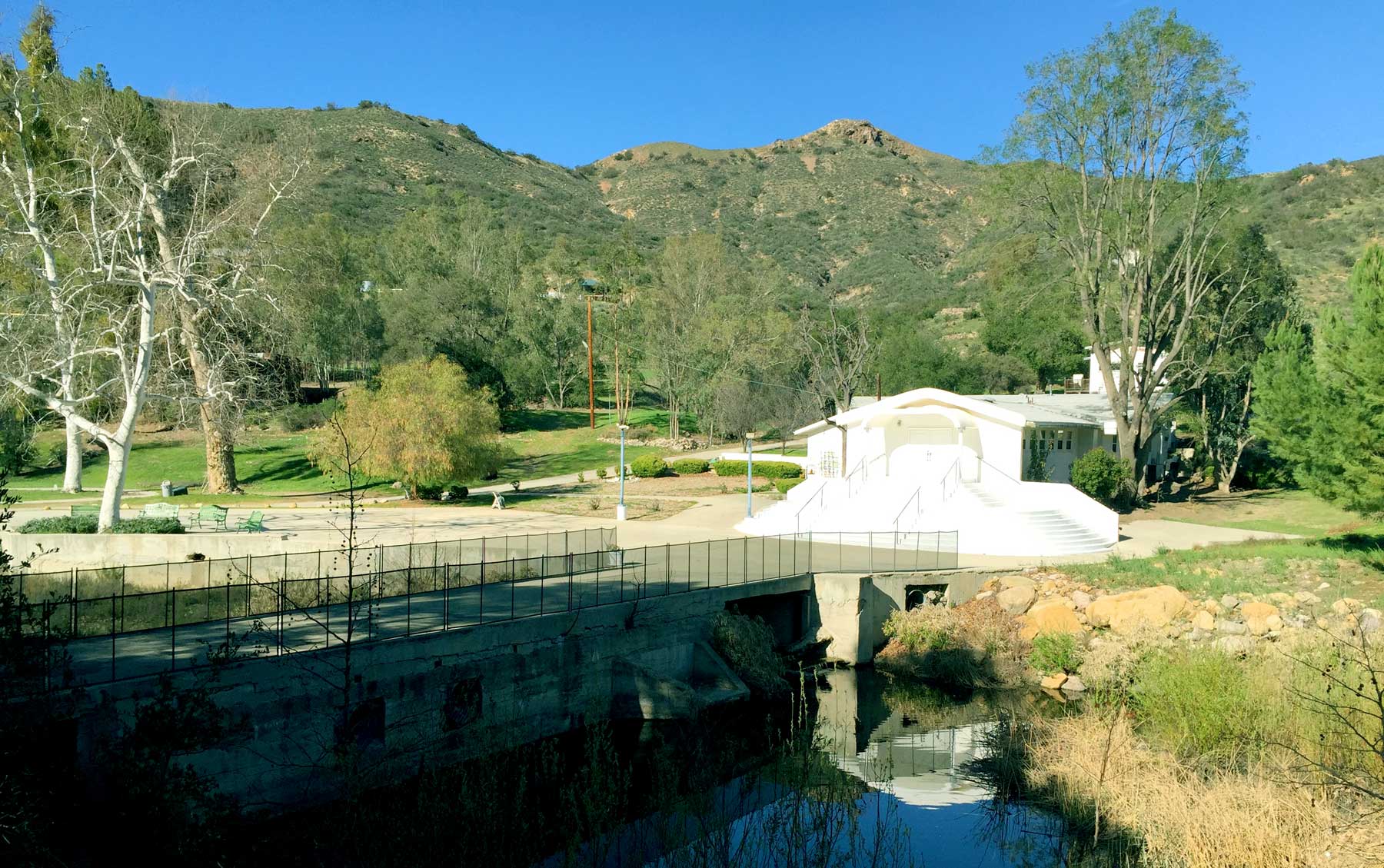Alice Coltrane remains a singular figure on the fringe of American music but her appeal is growing. While Coltrane’s music is gaining wider acceptance there is an entire era of her recorded output that remains obscure, almost as if by design. Her four self-published, devotional albums of the eighties and nineties were recorded during a period in which she had withdrawn from secular life. They were manufactured and distributed in limited quantities amongst her spiritual community. Little has been written about these albums released through her Avatar Book Institute, the publishing arm of The Vedantic Center ashram founded by Coltrane.
Alice was fully devoted to spiritual life. She took the name Swamini Turiyasangitananda and founded an ashram in a quiet canyon close to Malibu. Music was the foundation of her spiritual practice here and Turiya conducted devotees in Sanskrit chanting with the pulse of her Wurlitzer organ. She self-released four albums of devotional music through her ashram in the eighties and nineties. They are her most obscure body of work but possibly the greatest reflection of her soul. Alice Turiyasangitananda Coltrane passed in 2007 but she left this singular music. In this program, her family, students, collaborators, and scholars shine light on her transcendent ashram albums.
The interview subjects overwhelmingly concluded that Coltrane’s motivation in the recording of these albums was pure devotion to God. These works are a personal and universal statement of praise created by a master musician. Operating outside of the constraints of the commercial recording industry Coltrane was free of external pressures whether monetary or deadline. She recorded this music totally on her own terms. The resulting compositions synthesized her spiritual and musical outlook into a highly original work that is unique unto herself.
– Mark “Frosty” McNeill
[this piece originally appeared here.]
Radha Botofasina-Reyes
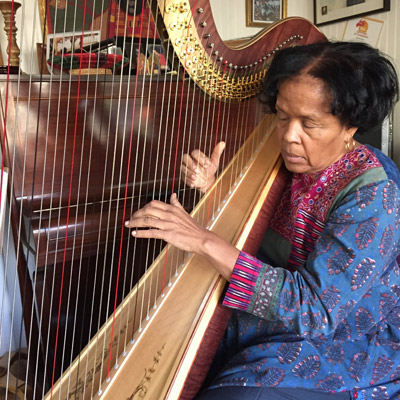 My name is Radha Botofasina-Reyes. Swamini would be the spiritual aspect that a certain group of people knew Alice Coltrane by. Her monastic name was Turiyasangitananda which means,“the Lord's highest, transcendental song of bliss.” In the late sixties, after John Coltrane had left his body, she went through a period of spiritual reawakening. At that time she was initiated directly by the Lord but she didn't don the orange robes until 1975 when she founded The Vedantic Center.
She'd speak about how she found that it's all within, all the music is within. And she also said music is an expression. For me, that's all she had to say, she didn't have to explain what kind of expression. It's just an expression when it's coming out of here, your heart.
Bhajans, it's a Sanskrit word. It means “soul chant.” That's a super loose interpretation. You're chanting the names of the Lord. It's just keeping you always saturated in this God consciousness. Oh my God, they could go on for like two or three hours and she would go like all over the universe. Sometimes you might have a spiritual heart attack or you could just, just cry and cry and cry. And sometimes you would get to the state where you couldn't sing anymore. All you could do is just say, and then Swamini would explain, "The end of all bhajan is mantra. Even if you don't believe it's gonna help. Just by saying it, it will help." Swamini explained to us that she was asked by the Lord to sing and so the first album Turiya Sings, we had no idea that Swamini could sing until one very auspicious morning like at 4:00 a.m., she went around and she had us all get these cassette players and she slipped the cassette into each of our cassette players. We're sitting outside and we listen and we did not know who it was singing. We thought—one person thought it was a man singing. You know, we just didn't know it was her. Swamini explained to us that her voice was what really the soul sounded like. It was so wonderful. It was just exalting. I've never heard anybody who would just sing with such absolute devotion to God. Sometimes it seems like it was a dream. Did I really experience that person, somebody so extraordinary? Did that really happen? Was she real? My soul is looking back in wonder.
My name is Radha Botofasina-Reyes. Swamini would be the spiritual aspect that a certain group of people knew Alice Coltrane by. Her monastic name was Turiyasangitananda which means,“the Lord's highest, transcendental song of bliss.” In the late sixties, after John Coltrane had left his body, she went through a period of spiritual reawakening. At that time she was initiated directly by the Lord but she didn't don the orange robes until 1975 when she founded The Vedantic Center.
She'd speak about how she found that it's all within, all the music is within. And she also said music is an expression. For me, that's all she had to say, she didn't have to explain what kind of expression. It's just an expression when it's coming out of here, your heart.
Bhajans, it's a Sanskrit word. It means “soul chant.” That's a super loose interpretation. You're chanting the names of the Lord. It's just keeping you always saturated in this God consciousness. Oh my God, they could go on for like two or three hours and she would go like all over the universe. Sometimes you might have a spiritual heart attack or you could just, just cry and cry and cry. And sometimes you would get to the state where you couldn't sing anymore. All you could do is just say, and then Swamini would explain, "The end of all bhajan is mantra. Even if you don't believe it's gonna help. Just by saying it, it will help." Swamini explained to us that she was asked by the Lord to sing and so the first album Turiya Sings, we had no idea that Swamini could sing until one very auspicious morning like at 4:00 a.m., she went around and she had us all get these cassette players and she slipped the cassette into each of our cassette players. We're sitting outside and we listen and we did not know who it was singing. We thought—one person thought it was a man singing. You know, we just didn't know it was her. Swamini explained to us that her voice was what really the soul sounded like. It was so wonderful. It was just exalting. I've never heard anybody who would just sing with such absolute devotion to God. Sometimes it seems like it was a dream. Did I really experience that person, somebody so extraordinary? Did that really happen? Was she real? My soul is looking back in wonder.
Varun Soni
My name is Varun Soni. I'm the Dean of Religious Life at the University of Southern California. Alice Coltrane has a significant religious legacy. We cannot really understand her impact without thinking about it through the lens of religion and spirituality, in addition to understanding it culturally and musically. We should study Alice Coltrane in the same way we study other religious figures. She reminds me of the famous quote by the French theologian de Chardin who said, "We are not human beings having a spiritual experience. We are spiritual beings having a human experience," and I felt like the human experience for Alice was her music but it was human insomuch as it connected her to her spiritual life and that is what Hindu theology is. Hindu theology is predicated on the notion that we all have a personal, individual soul but that's reflecting a larger, divine soul or a cosmic-consciousness. And so there is the personal or the human in all of us but that's actually a reflection of the cosmic or the universal. And for me, Alice's music is a way of going through the personal or the human to get to Godhead or cosmic consciousness and music served as that vehicle.
Sound is right at the center of the Hindu religious tradition. In the Western context or in the Abrahamic context we say, "In the beginning there was God and God was the word." Well, from the Hindu perspective, in the beginning there was sound and that sound is Om. It's the sound of universal consciousness. That's the sound of creation and destruction. It's a sound that connects consciousness together and it's the sound that is God. It doesn't represent God, it is God. Alice probably thought of her music as, channeling some kind of cosmic or divine consciousness or universal sound into something that humans could commune with and consume as a way of connecting the human with the divine. So the way that I think Alice approached sound was very much authentic within the tradition, all the way back from ancient times, where liberation was dependent upon mantra recitation and then later through congregational singing. My sense is that her music was personal, spiritual transformation and devotion. It was a reflection of her spiritual practice and it's a way for us to think more about where she was spiritually in her own life. It's almost autobiographical. She may have something in common with people like Sun Ra or George Clinton who in some ways used the imagery of Sci-fi and outer space and extraterrestrial civilization as a metaphor for a type of liberation theology or a type of liberation within the context of the civil rights movement. You know, “get on the mothership," is really a metaphor for, “let's do our own thing,” right. Same with Sun Ra, “space is the place." Space is the place because that's the place where Black Americans can be who they are, because at the time, the United States was not that place. And I think where George Clinton and Sun Ra are pointing to outer space as a metaphor for where marginalized people can be authentically themselves, Alice is pointing to inner space. They're looking to the stars, she's looking to the universe inside of her.
“Sita” Michelle Coltrane
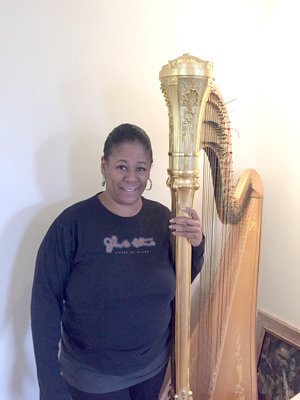 My name is Michelle Ann Coltrane, spiritual name is Sita. I'm Alice Coltrane's daughter.
This is a black woman from Detroit. She had an ashram in the westernized part of the world, became a guru, and left quite a legacy. She loved the organ because she—she was orchestrating so she had the ability to not only use both hands but she was using her feet. So to sustain those bass notes and then—then now a chord and then with the right hand doing lines and runs. It was just amazing to see that because she's kind of bouncing around on the organ. Never seen my mother smile so much. And she would stand up and that's how we knew the concert was over. She's got her foot on the pedal and then it
would still sustain after, like baaaaaaaahhhhhhhhmmmm [sound effect] you know. That was awesome. It's like almost equivalent to smashing the guitar or you know, throwing the mic down. When synthesizers came into play we'd encouraged mother to come to the music store to say you should check this out, and she's like, "No no, I, you know I'm good with—with what I have here." And when we went to the Guitar Center she started out on like, the basic model. A few people were kind of listening and then she kind of went up to the next model and a few more people started to gather around. Now she's at the Oberheim or the top, you know, playing with it and turning the knobs you know. And a crowd has kind of gathered. It was like the Pied Piper. She ended up purchasing it and really, she enjoyed the um, tricks that it could to. You know, the modulations and, uh. . . she referenced that to what the universe sounded like to her, and when it does the eeeeuuuuuooooooobooom [sound effect], it's reminiscent of the Om or the breath. It just has a very spiritual overtone. She wouldn't have said she was a singer. She just had to do it. She had to be the one to do it. I had never heard my mother sing like that before and all of a sudden this music came along and she added her vocals on it and they're—they're pretty sturdy. I just thought it was such a surprise. These are not diaries. This isn't things [sic] that we found that I don't—that were not intended to be shared publicly. This music was left here for some to hear and perhaps she knew that. That's why she left it for us.
My name is Michelle Ann Coltrane, spiritual name is Sita. I'm Alice Coltrane's daughter.
This is a black woman from Detroit. She had an ashram in the westernized part of the world, became a guru, and left quite a legacy. She loved the organ because she—she was orchestrating so she had the ability to not only use both hands but she was using her feet. So to sustain those bass notes and then—then now a chord and then with the right hand doing lines and runs. It was just amazing to see that because she's kind of bouncing around on the organ. Never seen my mother smile so much. And she would stand up and that's how we knew the concert was over. She's got her foot on the pedal and then it
would still sustain after, like baaaaaaaahhhhhhhhmmmm [sound effect] you know. That was awesome. It's like almost equivalent to smashing the guitar or you know, throwing the mic down. When synthesizers came into play we'd encouraged mother to come to the music store to say you should check this out, and she's like, "No no, I, you know I'm good with—with what I have here." And when we went to the Guitar Center she started out on like, the basic model. A few people were kind of listening and then she kind of went up to the next model and a few more people started to gather around. Now she's at the Oberheim or the top, you know, playing with it and turning the knobs you know. And a crowd has kind of gathered. It was like the Pied Piper. She ended up purchasing it and really, she enjoyed the um, tricks that it could to. You know, the modulations and, uh. . . she referenced that to what the universe sounded like to her, and when it does the eeeeuuuuuooooooobooom [sound effect], it's reminiscent of the Om or the breath. It just has a very spiritual overtone. She wouldn't have said she was a singer. She just had to do it. She had to be the one to do it. I had never heard my mother sing like that before and all of a sudden this music came along and she added her vocals on it and they're—they're pretty sturdy. I just thought it was such a surprise. These are not diaries. This isn't things [sic] that we found that I don't—that were not intended to be shared publicly. This music was left here for some to hear and perhaps she knew that. That's why she left it for us.
Purusha Hickson
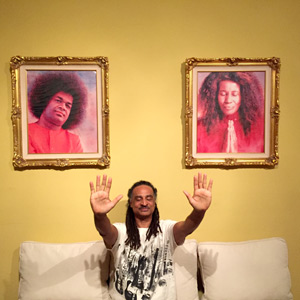 My name is Purushottama. Most people call me Purusha. Music played an important role in Swamini's spirituality and what she was teaching us. Right from the beginning we started chanting. The chanting was congregational chanting and Swamini would play the organ and usually it would be like, one person would lead and everybody else would respond. Some of the elders used to say, “God loves it when we pray but really loves it when we sing!" Bhajans are devotional songs. Often they contain mantras within them which are formulas that Krishna, as Rama, as Allah, as Ishvara, as Jehovah, as Jesus. Many names, one path. They create an internal vibration that helps to quicken our awakening. She was a very meticulous, precise person. When she was making an offering of something, the whole presentation, every aspect of it, would be done with all her attention, all of her care. So I think she did these albums with that kind of exactitude and I think she moved on. She told us, "Swamini does not live in the past." What was amazing about Swamini's music was that you had somebody who was devoted to God.
Was willing to sacrifice all of herself, all of her life, all of her being. That's what came out in music, that's what came out in her chanting. It was transcendental. I think it was Baker Bigsby who said, "Oh, it sounds like a spaceship landing in heaven." Divine and primal at the same time. It just vibrated to the core.
My name is Purushottama. Most people call me Purusha. Music played an important role in Swamini's spirituality and what she was teaching us. Right from the beginning we started chanting. The chanting was congregational chanting and Swamini would play the organ and usually it would be like, one person would lead and everybody else would respond. Some of the elders used to say, “God loves it when we pray but really loves it when we sing!" Bhajans are devotional songs. Often they contain mantras within them which are formulas that Krishna, as Rama, as Allah, as Ishvara, as Jehovah, as Jesus. Many names, one path. They create an internal vibration that helps to quicken our awakening. She was a very meticulous, precise person. When she was making an offering of something, the whole presentation, every aspect of it, would be done with all her attention, all of her care. So I think she did these albums with that kind of exactitude and I think she moved on. She told us, "Swamini does not live in the past." What was amazing about Swamini's music was that you had somebody who was devoted to God.
Was willing to sacrifice all of herself, all of her life, all of her being. That's what came out in music, that's what came out in her chanting. It was transcendental. I think it was Baker Bigsby who said, "Oh, it sounds like a spaceship landing in heaven." Divine and primal at the same time. It just vibrated to the core.
Wherever Swamini was in her own journey I think her music reflected where she was in that journey. She would tell us, "Everything in creation is evolving." And we got to watch her evolve as a teacher. When she first would give talks, very soft voice. Just like when she would teach the—the chants. She would never chant in the beginning but she had the Shakti. In her presence you felt it. She grew into the role of a teacher. Turiya Sings does catch some of that, her quantum growth when she came out with that amazing music.
Steven “Flying Lotus” Ellison:
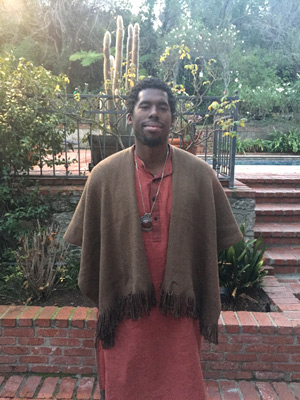 I am Steven Ellison, also known as Flying Lotus. Alice Coltrane was my aunt. Some know her as Alice Coltrane, some know her as Turiyasangitananda, but to me she was Auntie. I remember the ashram as kind of a journey. You know, you were going to the magical place, it had that feel to it. You know, you were going there on a magical Sunday. And as soon as you arrive it's just so quiet, you know, and there's all these people dressed up in white. There's a little mandir that everyone would go into and all be seated there on these little pillows and there'd be little instruments around. All different races, and I really liked seeing that, you know. As a kid I was like, "Oh wow, there's just—everyone's getting down." You know, everyone would come in with such a positive energy. You just feel it when you're there. You're just like oh, ok, this is— this is the real deal spiritual place. Yeah, and Auntie would come out and say some really 10 inspiring words and then she would start playing music and everyone else would join in and they might go two, three, four hours of doing that and then everybody leaves, wow. As a child going to the ashram was deep. The music was always crazy. Being um, encouraged to join in the circle of music happening, you know, that was a very cool experience to have. Just be surrounded [sic] by these people who are supporting you and you know, picking up an instrument and singing some stuff. You know, you'd be surprised. These people that you've been around for so long it's like, "Oh man, he's funky. Ok, alright. Yeah!" You know, you didn't see it coming but you know—and then, "Oh, she can sing like that? Wow!" She always would say that the voice is the most powerful instrument and the importance of playing every note, using the whole instrument for everything that it has. Which can be applied to everything creative. You know, use everything and have an understanding of the tools and when to use them. Someone's saying something for real here, you know, and I think that lo-fi angle really just gives that good saturation and I think that the funk helps to. You know, when it's funky and you can just groove to it, you know, it's like. . . .Maybe a lot of the music, you know the percussive music that we hear nowadays, this stuff makes more sense now, we're a little bit more familiar with these kind of rhythms now to embrace it. I think that she felt she had to do it. I don't think she ever tried to, you know, push it to be a big thing and I don't think that—that when you record this kind of music you can't come from that place. You know, it's more so like, you know if you—if you are seeking this kind of thing it's available to you. You know, I never thought that she was trying to make a big splash in the new age music scene, you know. [laughing] I just hope that when it comes to the music that if people 11 are seeking it they could find it. It should be there for you when you need.
I am Steven Ellison, also known as Flying Lotus. Alice Coltrane was my aunt. Some know her as Alice Coltrane, some know her as Turiyasangitananda, but to me she was Auntie. I remember the ashram as kind of a journey. You know, you were going to the magical place, it had that feel to it. You know, you were going there on a magical Sunday. And as soon as you arrive it's just so quiet, you know, and there's all these people dressed up in white. There's a little mandir that everyone would go into and all be seated there on these little pillows and there'd be little instruments around. All different races, and I really liked seeing that, you know. As a kid I was like, "Oh wow, there's just—everyone's getting down." You know, everyone would come in with such a positive energy. You just feel it when you're there. You're just like oh, ok, this is— this is the real deal spiritual place. Yeah, and Auntie would come out and say some really 10 inspiring words and then she would start playing music and everyone else would join in and they might go two, three, four hours of doing that and then everybody leaves, wow. As a child going to the ashram was deep. The music was always crazy. Being um, encouraged to join in the circle of music happening, you know, that was a very cool experience to have. Just be surrounded [sic] by these people who are supporting you and you know, picking up an instrument and singing some stuff. You know, you'd be surprised. These people that you've been around for so long it's like, "Oh man, he's funky. Ok, alright. Yeah!" You know, you didn't see it coming but you know—and then, "Oh, she can sing like that? Wow!" She always would say that the voice is the most powerful instrument and the importance of playing every note, using the whole instrument for everything that it has. Which can be applied to everything creative. You know, use everything and have an understanding of the tools and when to use them. Someone's saying something for real here, you know, and I think that lo-fi angle really just gives that good saturation and I think that the funk helps to. You know, when it's funky and you can just groove to it, you know, it's like. . . .Maybe a lot of the music, you know the percussive music that we hear nowadays, this stuff makes more sense now, we're a little bit more familiar with these kind of rhythms now to embrace it. I think that she felt she had to do it. I don't think she ever tried to, you know, push it to be a big thing and I don't think that—that when you record this kind of music you can't come from that place. You know, it's more so like, you know if you—if you are seeking this kind of thing it's available to you. You know, I never thought that she was trying to make a big splash in the new age music scene, you know. [laughing] I just hope that when it comes to the music that if people 11 are seeking it they could find it. It should be there for you when you need.
Shankari Adams
I'm Shankari Adams, a student of Swamini since the very beginning of the ashram. It was the most amazing feeling being in her presence, such a great spiritual energy, very evolved and yet very human. She said, "What everyone is looking for out there, you're not going to find it out there because the bliss that you're looking for, it's in your soul." This music, I feel, takes many people to that place within. To a whole different level of consciousness. Like you had entered a golden door of light. She often talked about the creative power of the sound vibration, you know, that Om was the first sound. She explained to us that it has the power to create, that sound can create matter. The mantra or the chanting has the power to change the thought forms. I recall times when the chants were going on and it seemed as we chanted, fewer and fewer people were chanting, and then sometimes you would just hear the organ because people had just transcended. Then Swamini continued to play and sometimes the chants have turned into a meditation, like—like a journey. We get a chance to really hear her voice. At first, I remember us listening, some of us said, "Who is that?" It was beautiful, but you know, it's like, “Oh Swamini has, she really has a voice.”
Ed Michel
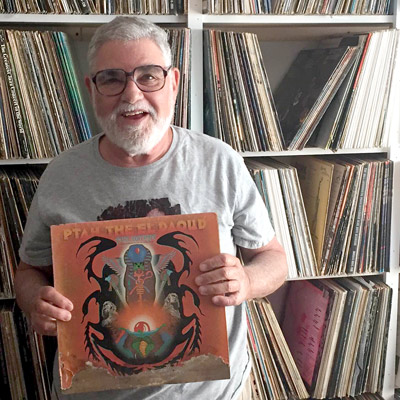 My name is Ed Michel. I was a producer. My time with Turiyasangitananda, Alice Coltrane was spent with her at Impulse and later at Warner Brothers. It was an unbelievable experience. Decisions were frequently made by her going home and meditating and refusing to give me an answer until she'd meditated long enough, which was exceedingly frustrating sometimes but always satisfactory in the results. She asked me to make an impossible edit in a free section of music and I said, "It's beyond my musical capability to decide where the edit should be. So you've got to help me." She said, "I'll go home and meditate on it." And she came back to the studio the next day and she said, "It's very interesting," she said, "I meditated last night and I spoke with the Father," which is how she always referred to John Coltrane, “and Stravinsky, and they were very helpful. Here's where you want to make the edit, right here." And I said, "It won't work. I'll do it, but it won't work,” and it worked. And that's the only time I got assistance from John Coltrane and Stravinsky to make a tape edit.
My name is Ed Michel. I was a producer. My time with Turiyasangitananda, Alice Coltrane was spent with her at Impulse and later at Warner Brothers. It was an unbelievable experience. Decisions were frequently made by her going home and meditating and refusing to give me an answer until she'd meditated long enough, which was exceedingly frustrating sometimes but always satisfactory in the results. She asked me to make an impossible edit in a free section of music and I said, "It's beyond my musical capability to decide where the edit should be. So you've got to help me." She said, "I'll go home and meditate on it." And she came back to the studio the next day and she said, "It's very interesting," she said, "I meditated last night and I spoke with the Father," which is how she always referred to John Coltrane, “and Stravinsky, and they were very helpful. Here's where you want to make the edit, right here." And I said, "It won't work. I'll do it, but it won't work,” and it worked. And that's the only time I got assistance from John Coltrane and Stravinsky to make a tape edit.
She was a powerhouse player. She used that Wurlitzer more like a synthesizer. She played it as though it were a woodwind. I don't know anybody who played keyboard like that except maybe Sun Ra and they used it as a saxophone section that could all improvise at once. She could make it talk. She came out of the Detroit musical culture and you don't lose your roots because you step into a different spiritual river. You step in with the same feet you had to begin with. And I don't know anything about singing and I don't know anything about gospel singing but I hear that and I say, "Oh, a Detroit soul singer." The pulse is in her voice and it's clear and distinct, it's unmistakable. She carries her own drummer internally.
Marilyn McLeod-Ellison
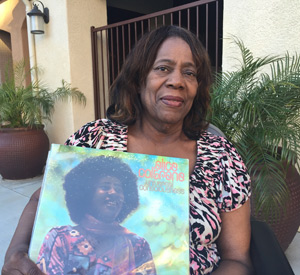 My name is Marilyn McLeod-Ellison. My sister Alice—I miss her very, very much but her presence is always here—so that makes me feel good, but she was a beautiful person and a spiritual person. I think I don't want to talk too much more about her because it—it gets a little touchy, but I loved her very much. She's my inspiration.
My name is Marilyn McLeod-Ellison. My sister Alice—I miss her very, very much but her presence is always here—so that makes me feel good, but she was a beautiful person and a spiritual person. I think I don't want to talk too much more about her because it—it gets a little touchy, but I loved her very much. She's my inspiration.
After she got with John, because he was definitely spiritual, she got really deeper in it. I feel like she just said, "This is what I'm going to do as long as I'm here on this earth." That's when you start knowing what somebody's about, you know, what's their main priorities [sic] in life. After she got the ashram I would take her every Sunday. I liked going there too because you're away from what you do normally. It takes you away totally from that. And then she would play the organ, just so dynamic, and it would just put you in such a beautiful mood. Oh God, you know, myself and her daughter Michelle, we both were at the hospital. I was in the bed with her and uh, she would like drift off, like just close her eyes and then she'd wake up and then she'd close her eyes again. And then when she woke up this last time she started kind of laughing, she said, "Oh, I seen Swamis, one of the swamis in India. He was at the train station.” And she was smiling and kind of giggling and stuff and at that time I just said, "Oh yeah, ok,"you know. I didn't say nothing about it until later after I started thinking about it, I think after she had gone. You know, she and I always, you know, knew about the music and there used to be a song about, "get ready for the train," or something like that you know. And when I thought about that I said maybe that's what she was talking about you know, it had to be. I haven't told too many people about that you know but I just think she was happy about the whole thing you know. She said, "You know, I saw Baba. He was at the train station." That's the last thing that I remember that she said to me.
Baker Bigsby
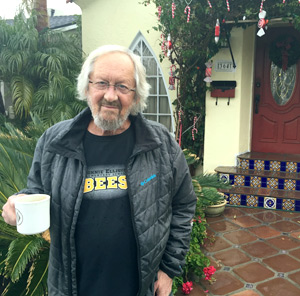 My name is Baker Bigsby. I was an audio engineer for Turiyasangitananda, also known as Alice Coltrane. I did the bulk of her recording, starting with Impulse Records and then after she became a swami, some of own material through the ashram. You can hear that what sounds like a traditional Indian chant also has what sounds like Baptist church singers. She attracted to her group of students a lot of musicians that were professionals in their own right and had their own music forms, and she didn't shy away from adding those influences into her compositions. She has that low mellow voice. It seemed to be absolutely perfect with the keyboard sounds that she had been generating for several years, almost like another set of keys on her Wurlitzer.
My name is Baker Bigsby. I was an audio engineer for Turiyasangitananda, also known as Alice Coltrane. I did the bulk of her recording, starting with Impulse Records and then after she became a swami, some of own material through the ashram. You can hear that what sounds like a traditional Indian chant also has what sounds like Baptist church singers. She attracted to her group of students a lot of musicians that were professionals in their own right and had their own music forms, and she didn't shy away from adding those influences into her compositions. She has that low mellow voice. It seemed to be absolutely perfect with the keyboard sounds that she had been generating for several years, almost like another set of keys on her Wurlitzer.
Certainly none were more unique than Alice Coltrane. She understood that music was God's language. It was a universal language. That you could speak it and express all the human emotions available to us on earth. So it was a way to communicate without specific religion, and it didn't matter what your language was, you could reach people worldwide in a musical format. She did have a spiritual insight that's not available to most people on this earth. She was probably the most extraordinary person I ever met in this life.
Reggie Workman
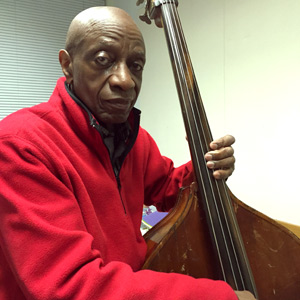 I am Reggie Workman, a musician, educator, human being. I have had the pleasure of working with the family of Coltrane, knowing John since he was very young in Philadelphia. We lived through parts of life where we made some music together. I was a close friend. During those years there were many people who were awakened. The way John was able to reach out, do what he did, study as much as he studied, achieve as much as he achieved. He sure had his ear to the ground and I'm sure he had his ear to the ground when he and Alice met and I think it was a beautiful move that they made music and family and links to eternity. She was very, very luminous, beautiful, warm, knowledgeable about the vibrations of people and what they stood for. She didn't talk about it very much but you could feel that she could feel and that she knew. That woman could reach some heights with the music that very few people could reach and I'm sure that was because of her spiritual being and her understanding and learning. 16 She was one who would listen and put the notes and chords in the place that they were needed, she was a master at that. She loved the Wurlitzer organ. So, what she could do with that organ, the way that she could express herself through notes and the way she found a method to make the notes bend and make them sound like John's soprano saxophone was amazing. I had so much pleasure realizing that, being a part of that, and hearing that sound with her. That was unique. I believe that as the universe evolves that different messages will come to us. Her music was before its time and therefore a lot of the people were just not ready to understand it. You know as you move, as you evolve, the obstacles that cause you not to hear or see certain things, you can see beyond. One thing I hope for it is that the spirituality of her music will reach more people and when it does, that those folks that it does reach, will be awakened by what she has put into the music—what message she has put into the music. That can be said of almost any era of music and great creators that we come by and she was definitely one of them.
I am Reggie Workman, a musician, educator, human being. I have had the pleasure of working with the family of Coltrane, knowing John since he was very young in Philadelphia. We lived through parts of life where we made some music together. I was a close friend. During those years there were many people who were awakened. The way John was able to reach out, do what he did, study as much as he studied, achieve as much as he achieved. He sure had his ear to the ground and I'm sure he had his ear to the ground when he and Alice met and I think it was a beautiful move that they made music and family and links to eternity. She was very, very luminous, beautiful, warm, knowledgeable about the vibrations of people and what they stood for. She didn't talk about it very much but you could feel that she could feel and that she knew. That woman could reach some heights with the music that very few people could reach and I'm sure that was because of her spiritual being and her understanding and learning. 16 She was one who would listen and put the notes and chords in the place that they were needed, she was a master at that. She loved the Wurlitzer organ. So, what she could do with that organ, the way that she could express herself through notes and the way she found a method to make the notes bend and make them sound like John's soprano saxophone was amazing. I had so much pleasure realizing that, being a part of that, and hearing that sound with her. That was unique. I believe that as the universe evolves that different messages will come to us. Her music was before its time and therefore a lot of the people were just not ready to understand it. You know as you move, as you evolve, the obstacles that cause you not to hear or see certain things, you can see beyond. One thing I hope for it is that the spirituality of her music will reach more people and when it does, that those folks that it does reach, will be awakened by what she has put into the music—what message she has put into the music. That can be said of almost any era of music and great creators that we come by and she was definitely one of them.
Oran Coltrane
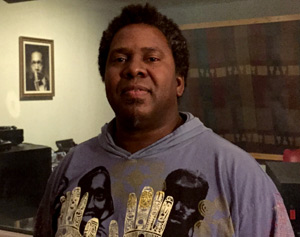 My name is Oran Coltrane. I’m the son of Alice and John Coltrane. I really feel blessed and honored to have been born into this family. Alice was such an incredibly beautiful human being. She had no ego whatsoever. She is a living example of what a person can accomplish when they’re dedicated and true to themselves. That’s what everybody—that’s what we’re striving for and this is a person that really got what she wanted. The reason this music has that appeal, it transcends language. Somehow you hear the essence behind it. You know there is something special about it. It’s like finding something very unusual on the earth that isn’t supposed to be here. I um, I just really .... I knew there was something great happening with her. She was for real. She really tapped into spiritual living, spiritual thinking and I saw the result of it….. And when she put her— her hands on the keyboard it was like somebody shooting a beam of light through your chest.
My name is Oran Coltrane. I’m the son of Alice and John Coltrane. I really feel blessed and honored to have been born into this family. Alice was such an incredibly beautiful human being. She had no ego whatsoever. She is a living example of what a person can accomplish when they’re dedicated and true to themselves. That’s what everybody—that’s what we’re striving for and this is a person that really got what she wanted. The reason this music has that appeal, it transcends language. Somehow you hear the essence behind it. You know there is something special about it. It’s like finding something very unusual on the earth that isn’t supposed to be here. I um, I just really .... I knew there was something great happening with her. She was for real. She really tapped into spiritual living, spiritual thinking and I saw the result of it….. And when she put her— her hands on the keyboard it was like somebody shooting a beam of light through your chest.

